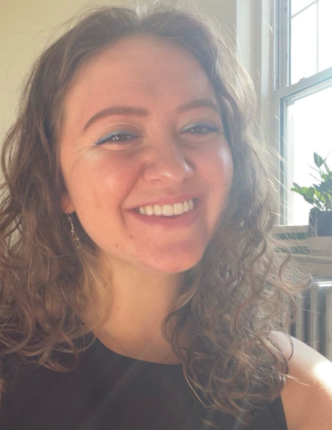
Since fifth grade, Bea Maron Schaeffer (YC ‘24) has wanted to become a teacher. Last spring, she had the opportunity to see the amount of time and thought that goes into being an effective teacher firsthand through a partnership with a public school teacher fostered by Professor Melissa Scheve’s Principles of Effective Teaching in the Secondary Classroom.
Thanks to this dream and experience, Bea spent last summer working as an Education Studies Research and Programming Assistant, helping to build the Yale Education Studies Partner Teachers Program, identifying key trends in the types of education-related jobs Yale alumni take up, and updating the program’s website.
The Partner Teachers Program pairs Education Studies students with New Haven Public School teachers to provide them with curricular material related to anti-racism and the opportunity to reflect on their practice. The program launched this past Fall with 15 partner teachers.
Behind the scenes, Bea drafted recruitment emails and acceptance letters to make the exciting new initiative possible. Additionally, Bea coordinated with Partner Teachers Program teachers to identify times Yale students could observe their classrooms and facilitated orientation sessions.
“I felt passionate about helping make the [Partner Teachers] program something that benefited the teachers who agreed to participate in it, not just the students who would have access to it through their Ed studies courses,” she said about her decision to accept her summer field experience.
Separately, Bea sorted through ten years of data from the Office of Career Strategy’s “First Destination” survey to determine what type of education jobs graduate students take. One of the major findings was that, despite the growth of Yale College and the Education Studies Program over the last decade, the number of students reporting that they are entering the education field upon graduation has remained nearly the same between 2013 and 2021 and the number going into teaching has declined since 2013. Bea presented her findings to the Office of Career Strategy workers, and they are now helping inform the Education Studies’ programming decisions.
The data research component was out of Bea’s comfort zone. As someone who has had her eyes on teaching for so long, she never expected to be doing education research this past summer. Nevertheless, she is grateful that she had this experience, which she found thanks to an email from Dr. Debs.
“I think everyone should try doing things they aren’t sure they’ll love from the start, like me agreeing to conduct research this summer,” she wrote.
Bea hopes her Education Studies peers get the chance to step out of their comfort zones too, and explore all that the field has to offer.